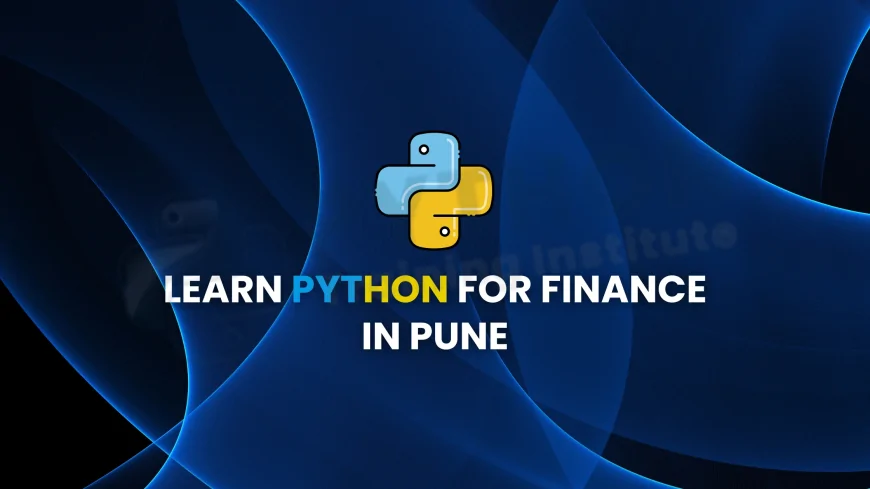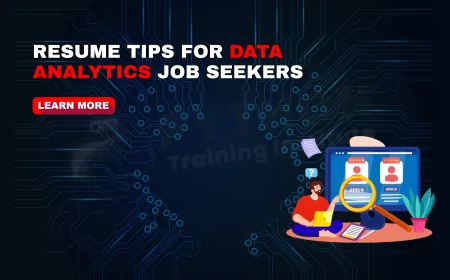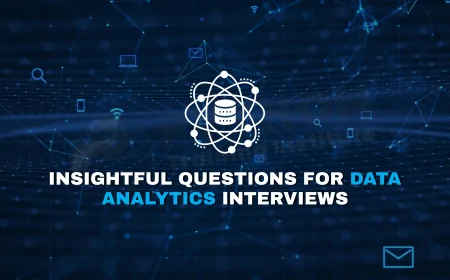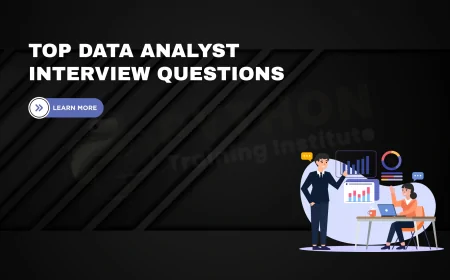Learn Python for Finance Applications in Pune | Finance-Oriented Python Programming Classes in Pune
Join top-rated Python for finance courses in Pune. Learn financial modeling, data analysis, and algorithmic trading with Python from leading institutes.

Table of Contents
- Overview
- Why Python for Finance?
- Who Should Attend?
- Key Skills You Will Learn
- Sample Curriculum and Projects
- Top Institutes Offering Python for Finance Courses in Pune
- Certification & Career Path
- FAQs
- Conclusion
Overview
Python has become a game-changer in the world of finance due to its power in handling complex calculations, data analysis, and automation. In Pune—a growing tech and finance hub—learning Python for financial applications can offer an exceptional edge to students, working professionals, and analysts. Whether you aim to build financial models, automate trading strategies, or visualize massive datasets, Python is the go-to tool.
Why Python for Finance?
Python has emerged as the go-to programming language in the financial industry due to its simplicity, power, and a vast ecosystem of libraries specifically suited for data analysis and automation. Whether you're involved in investment banking, quantitative finance, risk analysis, or fintech development, Python provides the perfect blend of accessibility and advanced functionality.
Key Reasons Why Python is Ideal for Finance:
-
Easy to Learn and Use:
Python's clear and readable syntax allows finance professionals—even those with minimal coding background—to quickly adopt and implement solutions. -
Rich Financial Libraries:
With libraries likepandas,NumPy,matplotlib,yFinance,QuantLib,TA-Lib, andBacktrader, Python covers everything from time-series analysis to options pricing and technical indicators. -
Data Analysis and Visualization:
Python enables professionals to handle large financial datasets, perform statistical analysis, and generate insightful visualizations for decision-making. -
Automation of Repetitive Tasks:
From report generation to fetching live stock data, Python helps automate manual processes, saving time and reducing errors. -
Integration with APIs and Databases:
Python can easily connect with financial APIs (like Alpha Vantage, Yahoo Finance) and databases (SQL, NoSQL), making it ideal for live data applications. -
Algorithmic Trading & Quantitative Finance:
It provides frameworks for backtesting trading strategies and building automated trading bots, a must-have skill in today’s markets. -
Strong Community & Industry Adoption:
Leading global banks such as Goldman Sachs, JP Morgan, and numerous fintech companies actively utilize Python for financial analytics and automation, driving a continuous demand for professionals proficient in Python."
Who Should Attend?
This course is ideal for:
- Finance students aiming to specialize in fintech or analytics
- Investment bankers and analysts interested in automation
- Chartered Accountants & CFA aspirants
- Quantitative researchers and traders
- Finance professionals transitioning into data science
Key Skills You Will Learn
- Python programming fundamentals
- Data cleaning & manipulation using Pandas
- Working with financial APIs (Yahoo Finance, Alpha Vantage)
- Time series forecasting & modeling
- Backtesting trading strategies
- Portfolio optimization & risk analysis
- Building interactive financial dashboards using Plotly
Sample Curriculum and Projects
Here’s what a typical Python for Finance course in Pune covers:
- Module 1: Introduction to Python & Jupyter
- Module 2: Pandas for Financial DataFrames
- Module 3: API Integration for Live Market Data
- Module 4: Statistical Modeling for Risk Management
- Module 5: Predictive Analysis using Time-Series
- Module 6: Strategy Automation using Backtrader
Project Examples:
- Building a Stock Screener for NIFTY 50
- Portfolio Value Tracker with Risk Metrics
- Crypto Trading Bot using Binance API
Top Institutes Offering Python for Finance Courses in Pune
- Webasha Technologies (Viman Nagar & Deccan): Specialized financial Python batches for analysts & traders.
Certification & Career Path
After completing the course, you can earn certifications that help in fintech careers:
- Python for Financial Analysis (Certificate of Completion)
- PCAP™ – Certified Associate in Python Programming
- Quantitative Finance with Python (Udemy/Coursera-based partner)
These certifications can help you pursue roles like:
- Financial Data Analyst
- Quantitative Researcher
- Algorithmic Trader
- Risk Analyst
- FinTech Developer
Frequently Asked Questions (FAQs)
1. What is Python used for in finance?
Python is used for financial modeling, risk assessment, algorithmic trading, and automating financial workflows.
2. Do I need a finance background to join?
No. A basic understanding of finance helps, but many courses are beginner-friendly and start with fundamentals.
3. How long does it take to complete a Python for finance course?
Typically, 6 to 12 weeks depending on course intensity and format (weekend/weekday).
4. Are there online options available in Pune?
Yes, most institutes in Pune offer both online and offline modes of training.
5. What tools will I learn apart from Python?
You’ll learn tools like Jupyter Notebook, Pandas, NumPy, Matplotlib, APIs, and possibly Backtrader or Dash.
6. Is this course suitable for CA or CFA candidates?
Yes, it complements their analytical work by adding automation and data science capabilities.
7. Will I get a certificate after the course?
Yes, most institutes provide a certificate of completion or assist in obtaining industry certifications.
8. Can I build trading bots with this course?
Yes, you’ll learn to fetch live data, analyze it, and even automate trading strategies.
9. Do institutes provide job assistance?
Top institutes like Webasha, offer placement support and internship options.
10. What programming knowledge is required?
No prior coding experience is required. Most courses start from Python basics.
11. Are the projects finance-specific?
Yes, they include stock price analysis, risk modeling, portfolio optimization, etc.
12. How does Python compare to Excel for finance?
Python is more powerful, scalable, and automatable than Excel, especially for big data or repetitive tasks.
13. Is this course good for Quant roles?
Absolutely. Many quant research roles prefer candidates proficient in Python and data handling.
14. Are live market APIs covered?
Yes, you’ll learn to use APIs like yFinance, Alpha Vantage, and sometimes broker-specific APIs.
15. Can this help in actuarial jobs?
Yes, especially in automating calculations and analyzing historical data sets.
16. Will I learn time series analysis?
Yes, courses cover time series forecasting and financial trend modeling.
17. What if I miss a class?
Institutes usually provide recorded sessions and LMS access for missed lectures.
18. What’s the average course fee in Pune?
Fees range from ₹10,000 to ₹35,000 depending on duration, content, and institute reputation.
19. Are weekend classes available?
Yes, weekend batches are popular for working professionals in Pune.
20. Can I build dashboards with this course?
Yes, you’ll learn to use Plotly, Dash, or Streamlit to build interactive financial dashboards.
Conclusion
With Pune’s rapid evolution into a financial and tech hub, acquiring Python skills focused on finance can open numerous doors. Whether you're transitioning from traditional finance roles or entering fintech, learning Python equips you with the tools to automate, analyze, and innovate in the finance world. Choose from top-rated institutes, engage in real-world projects, and get certified to propel your finance career into the future.
What's Your Reaction?
 Like
0
Like
0
 Dislike
0
Dislike
0
 Love
0
Love
0
 Funny
0
Funny
0
 Angry
0
Angry
0
 Sad
0
Sad
0
 Wow
0
Wow
0















